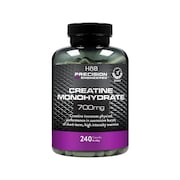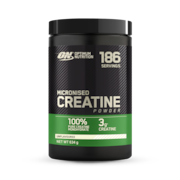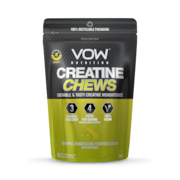20% off €35
Code:SAVE20
Best creatine monohydrate supplements for you

Creatine monohydrate’s a powerhouse of a product. It’s energy boosting and muscle enhancing among many other things. Discover the best creatine for you in this article…
Our top picks
700mg

Precision Engineered
Creatine Monohydrate 700mg 240 Capsules
Buy one get one 1/2 price
18+
€46.00
Vegetarian

Optimum Nutrition
Optimum Nutrition Micronised Creatine Monohydrate 634g
Save up to 1/2 Price
18+
€39.00
€52.00
Dairy Free

Vow Nutrition
Vow Nutrition Creatine Chews Apple, Mango & Lime 100 Chews
18+
€26.00
Creatine monohydrate (creatine for short) is a supplement that is widely used to ramp people’s athletic performance up a gear. The beneficial effect is obtained with a daily intake of 3g of creatine.
One of the reasons why it’s got such a massive following is because research has proven it time and again to be one of the most popular supplements for exercise performance.1
What is creatine exactly?
When it comes to understanding creatine monohydrate’s make-up, it’s essential to look at it from two perspectives – the body’s version of creatine and the creatine that’s manufactured synthetically.
Creatine that’s produced by our bodies
This is naturally made in our kidneys and our livers by the amino acids, glycine, arginine, and methionine. Our body converts this trio of amino acids into creatine phosphate and phosphocreatine, which are then stored in our skeletal muscles and used for energy.2 More specifically, it’s creatine that’s responsible for making something called Adenosine Triphosphate (ATP) which provides our bodies with energy for muscle contractions.3
Manufactured creatine
This is made by combining sarcosine, sodium salt, and cyanamide, an amide compound, in a steel reactor. In the reactor, they’re heated under pressure to create creatine crystals.
The crystals are further refined, and any unwanted particles are filtered out before the crystalline creatine is passed through the milling process.4
In short, creatine has many benefits.
If you're interested in building muscle mass or want more energy for your workouts, creatine has you covered.
Some of creatine’s benefits include:
- increased lean muscle mass – creatine can help muscle cells to produce more energy
- faster muscle recovery – especially during exercise, creatine helps contribute to increased performance
- high-intensity exercise performance is enhanced – due to creatine’s direct role in ATP production. This then leads to adding muscle mass and significantly increasing lean body weight
It’s because of this that creatine’s often taken to achieve short bursts of speed and energy for activities such as weightlifting and sprinting.
So yes, creatine can be great for you, promoting strength during exercise. But for all the widespread usage and adoration, the scientific research that’s been done on creatine’s impact is a bit of a mixed bag.
On the one hand, studies have found that it can help improve performance during short bursts of activity. While on the other, there’s no evidence of its ability to help with endurance pursuits.
In the meantime, research has also revealed that not everybody’s muscles respond to taking it either.5
What’s the best creatine for you?
As is the case with all supplements, deciding on the best creatine for you often depends on personal preference.
For instance, how often you want to take it, how you want to take it (e.g., as a capsule or as liquid creatine) and whether you want it to be pre-combined (if available) with anything else.
These capsules contain ultra-pure creatine monohydrate to boost even more energy.
Our customers have given them a 4.5 out of 5-star rating.
According to Stepgym, they’re:
‘Easy to take ... and improve my endurance and make me feel good about my workouts and that I made the effort to take it.’
This powder contains 3g of creatine monohydrate per serving and mixes easily with juice or water.
Our customers have given it a 4.2-star rating.
Robert M says:
‘It’s the best. It’s strong creatine and good quality, if you try this product, you will see more power!!!’
They’re a quick and easy way to get your creatine hit. They’re also great for people who find consuming powders, pre-workouts, or creatine shakes too heavy – simply chew away for the same results!
Pre-workout formulas
Get your muscles ready for exercise and get the most out of your physical activity.
Our customers love Grenade’s Berry Blast. Bruce Mac says it’s ‘rocket fuel’, while Lori90 ‘loves the kick she gets from it before workouts and the noticeable lift in energy.’
Also, check out Optimum Nutrition Gold Standard Pre-Workout Powder
What about vegan creatine?
There are vegan creatine supplements on the market too.
They include Vox’s creatine chews are suitable for vegans too. Each chew contains 5g of creatine and can be consumed alongside other creatine supplements.






